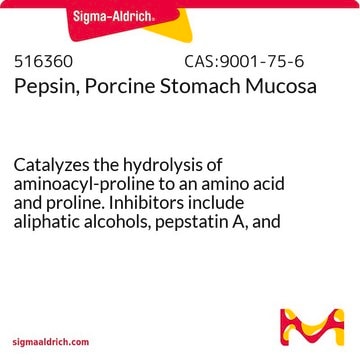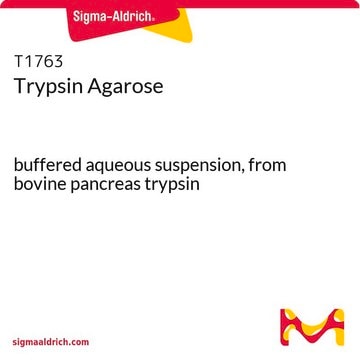P0609
Pepsin−Agarose from porcine gastric mucosa
lyophilized powder, ≥30 units/mg dry solid
Synonym(s):
Pepsin A
About This Item
Recommended Products
biological source
Porcine gastric mucosa
form
lyophilized powder
specific activity
≥30 units/mg dry solid
mol wt
35 kDa
matrix
4% cross-linked beaded agarose
UniProt accession no.
storage temp.
−20°C
Gene Information
pig ... LOC396892(396892)
General description
Application
Biochem/physiol Actions
Unit Definition
Quantity
Physical form
inhibitor
Signal Word
Danger
Hazard Statements
Precautionary Statements
Hazard Classifications
Resp. Sens. 1
Storage Class Code
11 - Combustible Solids
WGK
WGK 3
Flash Point(F)
Not applicable
Flash Point(C)
Not applicable
Personal Protective Equipment
Certificates of Analysis (COA)
Search for Certificates of Analysis (COA) by entering the products Lot/Batch Number. Lot and Batch Numbers can be found on a product’s label following the words ‘Lot’ or ‘Batch’.
Already Own This Product?
Find documentation for the products that you have recently purchased in the Document Library.
Customers Also Viewed
Articles
Antibody fragmentation with our pepsin digestion protocol for IgG antibody fragmentation and preparation of F(ab’).
Protocols
This procedure may be used for determination of Pepsin activity using hemoglobin as the substrate. It is a spectrophotometric stop rate determination.
Our team of scientists has experience in all areas of research including Life Science, Material Science, Chemical Synthesis, Chromatography, Analytical and many others.
Contact Technical Service









